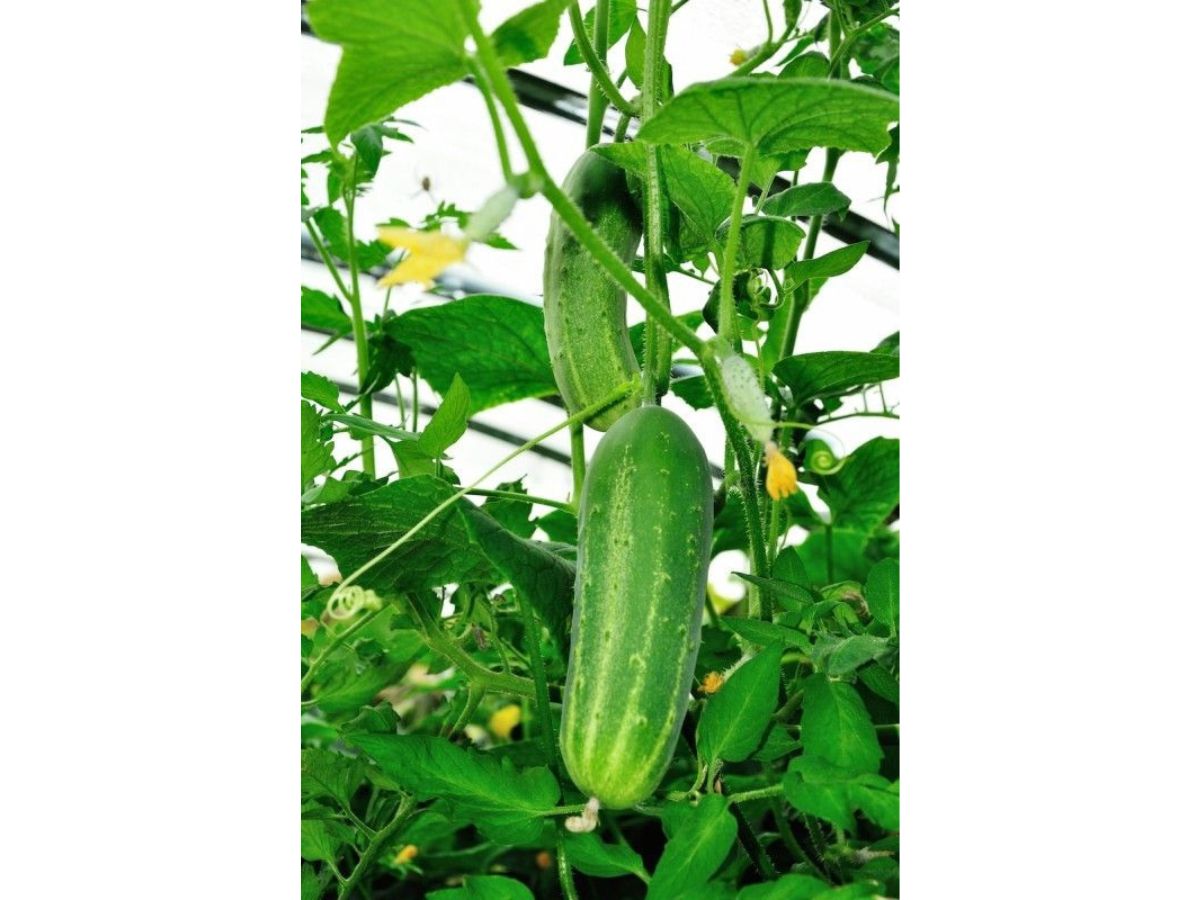How to Grow
How to grow cucumber (khira) from seeds
Isn't a plate of peeled cucumbers familiar to almost all Indians, whether for lunch or dinner?
The elderly members of the family have always told us that cucumber is good for digestion, skin, and summer temperatures.
Thus, quite naturally, one word that comes to mind with the mention of cucumber is "refreshing." The high water content of this fruit provides a cooling effect in sultry summer seasons.
A sprinkle of black salt and black pepper tastes fantastic on this crunchy, slightly melon-like fruit. Mixed with onions, carrots, and some boiled peas, it becomes a proper, fulfilling, healthy snack item.
Is that all about cucumbers?
No, cucumbers also help with weight loss, are nutrient-rich, antioxidant-rich, and boost the immune system.
In this blog, we will get to know cucumbers better and learn about the following:
- Few interesting facts about cucumber
- How to grow cucumber (khira) from seeds
- How to care for cucumber plants
- Unique health benefits of cucumber
Eager to learn more? So, let’s get started.
Few interesting facts about cucumber
- In the Cucurbitaceae family, cucumber is a widely grown creeping vine plant with cylinder-shaped fruits that is indigenous to South Asia.
- The world's largest producer of cucumbers is China.
- According to legend, in 1494, Christopher Columbus transported cucumbers to Haiti.
- Cucumber slices or puree might provide sunburn treatment right away.
- Cucumber can also reduce the puffiness of the eyes and dark circles around the eyes
- Around the 2nd or 3rd millennium BC, India became the first country to domestically grow cucumbers.
- Do you know that there can be a 20-degree difference between the inside of a cucumber and the real temperature outside?
How to grow cucumber (khira) from seeds
Cucumber is an easy to growing high yielding plant. You can grow it easily at your backyard or opt for a bush gardening on your balcony or terrace. Just make sure, it receives plenty of sunlight and water. The following steps would help you to grow cucumber from seeds: -
Step 1: Preparing the soil
- In this step, you have to find a bright and sunny spot in your indoor, outdoor, or terrace garden area.
- Remove weeds from this area because they drain nutrients and water from the soil, starving your cucumbers.
- For optimal results, yank up as much of the weed's root as you can by hand. There is a good chance that the same weed will reappear if the root is left behind.
- It is suggested not to use herbicides as they make the soil unsuitable for overall growth.
- Now, check the soil pH and make sure your soil has a pH level of 7.0. If it is lacking, then you may add agricultural lime to increase the pH, and if you want to decrease the pH level, then add sulfur or aluminum sulfate.
Step 2: Fertilize your soil
- The slow-release granular fertilizer will best feed your cucumbers throughout their growth cycle if you're using inorganic fertilizer.
- Use aged manures or rich compost for natural fertilizer. They should first be blended into the soil to a depth of about 2 inches (5.1 cm), and then cut and worked into the soil gradually until it is 6 to 8 inches (15 to 20 cm).
Stage 3: Temperature check
You have to plant when the soil temperature is 21 degrees Celsius.
Stage 4: Water the soil
Dip your finger into the soil and see how moist it is before planting. If you feel the soil is dry, moisten the soil before spreading the seeds. Use a watering can so that the water is gentle on the ground.
Stage 5: Spread the cucumber seeds
Simply scatter three to four seeds in a group every 18 to 36 inches on the ground or in a container. You can choose the strongest plant by planting many seeds together.
Stage 6: Seeds into soil
Slightly press the seeds into the soil. The soil should not be sown with cucumber seeds deeper than 1 inch (2.5 cm). Alternatively, you might set them on top of the soil and then cover them with topsoil that is the same depth.
Stage 7: Spacing is important
Cucumber plants love space to grow. Cucumber vines grow up to a height of 6 to 8 feet (1.8 to 2.4 m) and that will easily cover the ground in sizable gardens. So, you have to leave plenty of space to cucumber vines; otherwise, the produce would be bitter, and after a point, the plants will eventually cease producing.
Stage 8: Trellis for better growth
- Creating a trellis is suggested for better results. When cucumbers are grown vertically with the help of a trellis, they get better exposure to sunshine, and thus the produce multiplies.
- To build a cage with a diameter of 12 to 18 in (30 to 46 cm), use welded wire fencing or hog wire that is 4 or 5 ft (1.2 or 1.5 m) tall. A cage of this size can hold two or three vines.
- You can gently wrap the vine tendrils around the wire as your plant grows to encourage it to climb the trellis.
How to care for cucumber plants
Cucumbers are easy to grow plants but there are some basic minimal requirements that must be fulfilled. The basic requirements for a cucumber plant are explained below.
Soil
The perfect soil for cucumbers is loose, light, and sandy because this type of soil gets warmer more quickly and retains that warmth more easily. If you have more clay in your soil, add organic material. Dense, heavy soil can be improved with peat, compost, or rotted manure. Also, remember that the soil pH must be around 7 for better cucumber growth.
Temperature
Cucumber plants thrive in temperatures between 23 and 33 degrees Celsius. Therefore, if you live in an area where the temperature often increases beyond this threshold, you must shield your plants from the intense afternoon sun. Use tall plants nearby to offer some shade, or cover the plants with a cloth.
Fertilizer
If, as previously said, fertilizer was applied prior to seeding, then wait until runners start to grow on the vines and flowers start to bloom. Now apply either a organic feed, a light liquid fertilizer, compost, or aged manure every two weeks. Feed your plant a high-nitrogen fertilizer if you notice the leaves turning yellow, as this indicates that your plant needs more nitrogen.
Mulching
When the seeds begin to sprout, add mulch. Mulch aids in preventing weed growth, which might deprive your cucumber plants of necessary nutrients. Additionally, it keeps the soil warm and wet. Use a darker mulch to offer more warmth.
Location
The bright and sunny spot in your garden, backyard, terrace, or balcony is the best location for the growth of cucumbers. You may also opt for the window that receives the most sunlight.
Sunshine
Cucumbers are a tropical vegetable, and that’s why they crave a lot of direct sunlight. So, choose a spot where they won't be too shaded from the afternoon sun. 6-8 hours of direct sunlight is thus a basic requirement.
Water
Cucumber plants would require at least 1-2 inches of water every week for their hydration purposes. Also, moisten the soil surrounding the cucumber plants. When the plant blooms and begins to produce fruit, you must exercise extreme caution. A cucumber with a bitter flavor could come from underwatering at this time. Avoid overwatering because moist leaves might result in powdery mildew. You can opt for a drip irrigation system for a consistent flow of moisture.
Unique health benefits of cucumber
One of the best things about cucumber is that it helps you stay hydrated and, due to its high fiber content, keeps you away from constipation. The following are just a few of the numerous additional health advantages of cucumbers: -
Regulates blood pressure
Cucumber lowers blood pressure and lowers the risk of heart disease since it is a good source of magnesium, potassium, and dietary fiber. According to research, elderly people with hypertension and high blood pressure should regularly consume cucumbers.
Good for weight loss
Cucumbers are minimal in calories and are 96% water. 100 g of cucumber contain only 15.5 calories. The amount of fat in one medium-sized cucumber is 0. They are excellent if you want to lose weight.
Aids good digestion:
We can keep our stomachs cool by eating cucumbers. Cucumbers' soluble fiber aids in slowing our digestive processes. Additionally, the high water content of cucumbers softens our stools, avoids constipation, and maintains regularity in our bowel movements.
Always keeps you hydrated
96% of cucumber is water. So, what else do you need to keep yourself hydrated? We are more prone to dehydration in the summer, so you must be sure to eat cucumbers throughout those hot and humid months.
Cooling effect
Our body heat increases in the summer because of the high temperatures outside. So if you don't properly hydrate yourself or don't include foods that are cool for your body, you could get sick fast. You must eat cucumbers because they are 96% water and have a cooling effect.
Detoxifies your system
In almost all detox juices that your nutritionist or dietician prescribes, you will find cucumber. Why? Because cucumber is great at flushing out toxins from your system, rejuvenating your cells, hydrating your body, and keeping you fit.
For glowing skin
Whether you eat it or apply the juice topically, cucumber will enhance the glow of your skin. People who regularly eat cucumbers and apply cucumber juice to their faces have softer, shinier skin. Cucumber's anti-inflammatory properties also aid in the removal of dark spots and tans. It also reduces wrinkles and fine lines.
May prevent cancer:
According to research, cucumbers' fiber guards against colorectal cancer. Additionally, cucumbers contain cucurbitacin, which has anti-cancer potential.
Prevents Bad Breath:
Cucumbers contain phytochemicals that kill the microorganisms in our mouths that produce bad breath.
In a nutshell, it is clear that if you want a good, healthy life, consumption of cucumbers is a must. As it is a fuss-free plant, you can easily grow it in your home by following the steps mentioned in this blog. Hope you find it useful.
FAQ regarding cucumbers: -
Is it good to eat cucumbers daily?
Yes, eating one cucumber a day can be beneficial. Because it is mostly water, it will keep you hydrated and full for a longer period of time.
Is cucumber good for weight loss?
Yes, cucumber is good for weight loss as it is low in calories, zero in fat, and contains 96% water.
What are the benefits of cucumber?
In addition to 96% water, cucumbers also include iron, calcium, zinc, magnesium, phosphorus, potassium, vitamins B1, B2, B3, B5, and B6, folic acid, and vitamin C. Cucumber is therefore useful for digestion, controlling blood pressure, losing weight, avoiding skin conditions, etc.
How long do cucumbers take to grow?
Cucumbers are ready for harvest 50 to 70 days after planting.
References:





